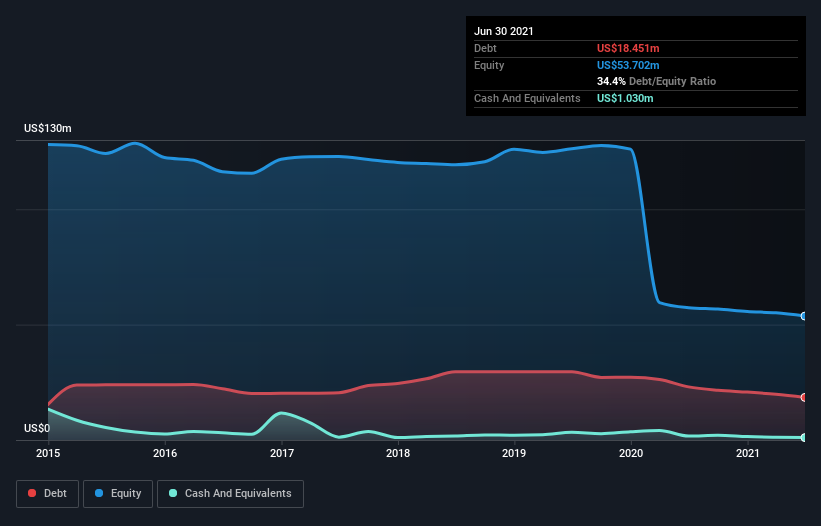
Some say volatility, rather than debt, is the best way to think about risk as an investor, but Warren Buffett famously said that 'Volatility is far from synonymous with risk.' So it might be obvious that you need to consider debt, when you think about how risky any given stock is, because too much debt can sink a company. We note that Kolibri Global Energy Inc. (TSE:KEI) does have debt on its balance sheet. But should shareholders be worried about its use of debt?
Why Does Debt Bring Risk?
Debt is a tool to help businesses grow, but if a business is incapable of paying off its lenders, then it exists at their mercy. In the worst case scenario, a company can go bankrupt if it cannot pay its creditors. However, a more common (but still painful) scenario is that it has to raise new equity capital at a low price, thus permanently diluting shareholders. By replacing dilution, though, debt can be an extremely good tool for businesses that need capital to invest in growth at high rates of return. When we examine debt levels, we first consider both cash and debt levels, together.
Check out our latest analysis for Kolibri Global Energy
What Is Kolibri Global Energy's Net Debt?
You can click the graphic below for the historical numbers, but it shows that Kolibri Global Energy had US$18.5m of debt in June 2021, down from US$23.0m, one year before. However, it also had US$1.03m in cash, and so its net debt is US$17.4m.

How Healthy Is Kolibri Global Energy's Balance Sheet?
We can see from the most recent balance sheet that Kolibri Global Energy had liabilities of US$24.0m falling due within a year, and liabilities of US$2.29m due beyond that. Offsetting this, it had US$1.03m in cash and US$1.59m in receivables that were due within 12 months. So its liabilities outweigh the sum of its cash and (near-term) receivables by US$23.7m.
Given this deficit is actually higher than the company's market capitalization of US$17.8m, we think shareholders really should watch Kolibri Global Energy's debt levels, like a parent watching their child ride a bike for the first time. In the scenario where the company had to clean up its balance sheet quickly, it seems likely shareholders would suffer extensive dilution. There's no doubt that we learn most about debt from the balance sheet. But it is Kolibri Global Energy's earnings that will influence how the balance sheet holds up in the future. So if you're keen to discover more about its earnings, it might be worth checking out this graph of its long term earnings trend.
In the last year Kolibri Global Energy had a loss before interest and tax, and actually shrunk its revenue by 8.2%, to US$12m. That's not what we would hope to see.
Caveat Emptor
Over the last twelve months Kolibri Global Energy produced an earnings before interest and tax (EBIT) loss. Its EBIT loss was a whopping US$2.9m. When we look at that alongside the significant liabilities, we're not particularly confident about the company. It would need to improve its operations quickly for us to be interested in it. It's fair to say the loss of US$3.6m didn't encourage us either; we'd like to see a profit. In the meantime, we consider the stock to be risky. There's no doubt that we learn most about debt from the balance sheet. But ultimately, every company can contain risks that exist outside of the balance sheet. Case in point: We've spotted 3 warning signs for Kolibri Global Energy you should be aware of, and 1 of them is significant.
At the end of the day, it's often better to focus on companies that are free from net debt. You can access our special list of such companies (all with a track record of profit growth). It's free.
If you're looking to trade Kolibri Global Energy, open an account with the lowest-cost platform trusted by professionals, Interactive Brokers.
With clients in over 200 countries and territories, and access to 160 markets, IBKR lets you trade stocks, options, futures, forex, bonds and funds from a single integrated account.
Enjoy no hidden fees, no account minimums, and FX conversion rates as low as 0.03%, far better than what most brokers offer.
Sponsored ContentValuation is complex, but we're here to simplify it.
Discover if Kolibri Global Energy might be undervalued or overvalued with our detailed analysis, featuring fair value estimates, potential risks, dividends, insider trades, and its financial condition.
Access Free AnalysisThis article by Simply Wall St is general in nature. We provide commentary based on historical data and analyst forecasts only using an unbiased methodology and our articles are not intended to be financial advice. It does not constitute a recommendation to buy or sell any stock, and does not take account of your objectives, or your financial situation. We aim to bring you long-term focused analysis driven by fundamental data. Note that our analysis may not factor in the latest price-sensitive company announcements or qualitative material. Simply Wall St has no position in any stocks mentioned.
Have feedback on this article? Concerned about the content? Get in touch with us directly. Alternatively, email editorial-team (at) simplywallst.com.
About TSX:KEI
Kolibri Global Energy
Engages in the finding and exploiting oil, gas, and clean and sustainable energy in the United States.
High growth potential with adequate balance sheet.


